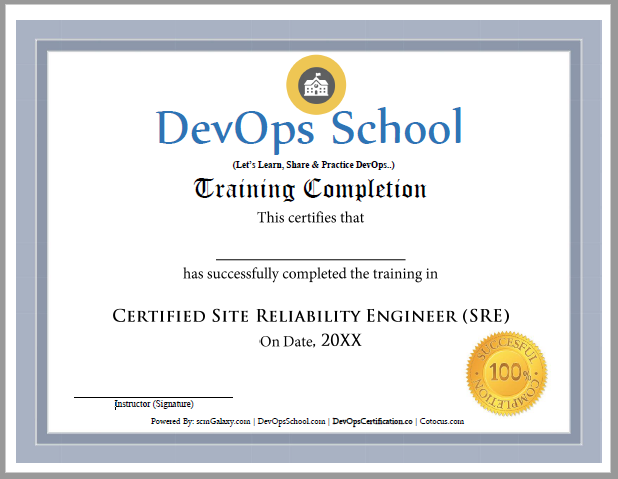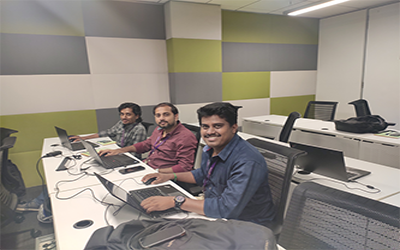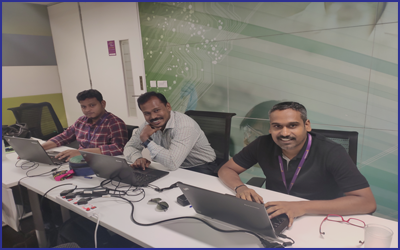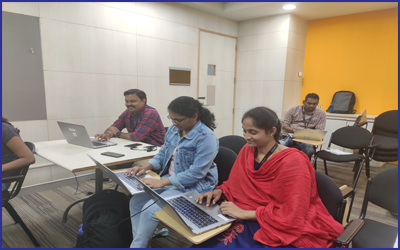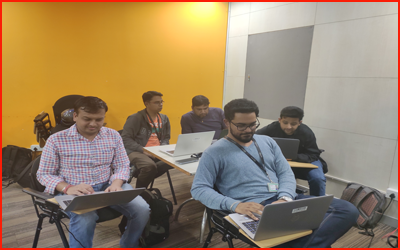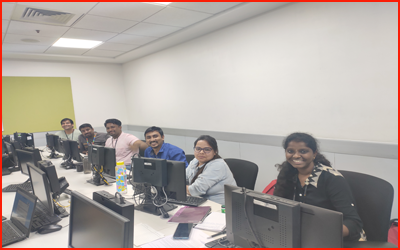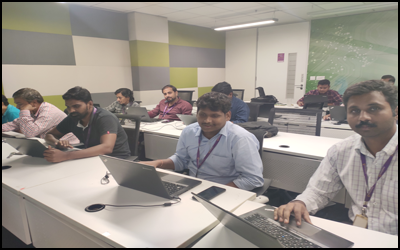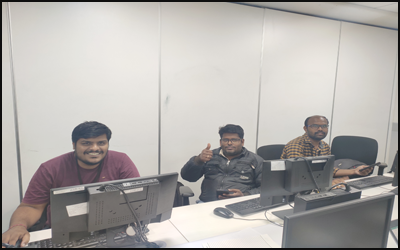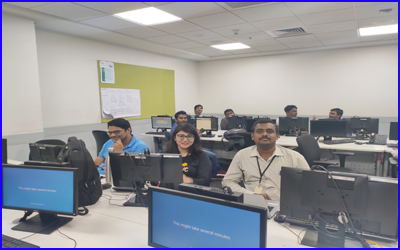Site Reliability Engineering (SRE) Training and Certified
Course Duration
72 hours/6 Days
Live Project
01
Certification
Industry recognized
Training Format
8000+
Certified Learners
15+
Years Avg. faculty experience
40+
Happy Clients
4.5/5.0
Average class rating
How DevOpsSchool will help in SRE Certification & Courses
The Site Reliability Engineering (SRE) certification course by DevOpsSchool will help you to learn the principles & practices that allows an organization to reliably and economically scale critical services. SRE is a process of operations which emphasize to accumulate software engineering and automation solutions to ensure that continuously delivered applications are running efficiently and reliably. Our SRECP course highlights the progression of SRE in modern software engineering process and its future direction and prepares learners with the methods, practices, and tools to engage workforce across the organization involved in reliability and stability evidenced through the use of real-life scenarios and case stories.
Site Reliability Engineering(SRE) Training and Certification - Instructor-led, Live & Interactive Training
Duration |
Mode |
Batches |
|---|---|---|
72 Hrs (Approx) |
Online (Instructor-led) |
Public batch |
10 Days |
Classroom |
Public batch |
10 Days |
Corporate (Online/Classroom) |
Contact US |
Course Price at
49,999/-
No Negotiation
What is Site Reliability Engineering (SRE)?
Site Reliability Engineering (SRE) is a discipline that incorporates aspects of software engineering and applies them to infrastructure and operations problems. The main goals are to create scalable and highly reliable software systems. According to Ben Treynor, founder of Google's Site Reliability Team, SRE is "what happens when a software engineer is tasked with what used to be called operations."
Know about Site Reliability Engineering (SRE)?
Site Reliability Engineering (SRE) is a certification from DevOpsCertification.co. The Objective of this certification and its associated course is to impart, test and validate knowledge of SRE vocabulary, principles and practices. Site Reliability Engineering Certified Professional (SRECP) is intended to provide individuals an understanding of basic SRE concepts and how SRE may be used to improve operational activities by applying Site Reliability Engineering principles and engineering practices in Software Development Lifecycle.
This course teaches the theory of Service Level Objectives (SLOs), a principled way of describing and measuring the desired reliability of a service. Upon completion, Certified Professional should be able to apply these principles to develop the first SLOs for services they are familiar with in their own organizations.
Certified Professional will also learn how to use Service Level Indicators (SLIs) to quantify reliability and Error Budgets to drive business decisions around engineering for greater reliability. The learner will understand the components of a meaningful SLI and walk through the process of developing SLIs and SLOs for an example service.
What is Advantage of SRECP certification?
A Site Reliability Engineering (SRE) Engineer is a professional who understands the principles of performance evaluation and prediction to improve product/systems safety, reliability and maintainability.
How to become Site Reliability Engineering (SRE)?
Please contact contact@DevOpsSchool.com
What you would Learn?
You'll learn:
- How to run reliable services in environments you don't completely control-like cloud
- Practical applications of how to create, monitor, and run your services via service level objectives
- How to convert existing ops teams to SRE-including how to dig out of operational overload
- Methods for starting SRE from either greenfield or brownfield
Agenda of the Site Reliability Engineering (SRE) Download Curriculum
- Java Basics( DevOps Perspective)
- Python Basics( DevOps Perspective)
- SQL Basics
- Spring Boot Basic Level
- MS Office
- Software Architecture
- ITSM ( General Process)
- Distributed Systems
- Microservices
- AWS Components ( Including WAF)
- CI/CD Pipeline using Jenkins
- Kubernetes and Docker
- Terraform
- AWS CoE Postmortems
- Assessment
- Why SRE ?
- SRE Principles and Practices
- What is SLI, SLO and SLA
- How to define meaningful SLI and its significance
- How to define meaningful SLO and its significance
- What is SLA and its significance?
- Assessment
- EC2 ( Elastic Cloud Computing)
- About EC2 and types , Pricing
- EIP ( Elastic IP address), Allocating, associating , releasing
- Launch windows and Linux Instances in AWS
- Connecting windows and Linux instances from windows desktop and Linux machine
- Monitoring and alerting
- S3 ( Simple Storage Service)
- Creating S3 Buckets and putting objects in
- bucket
- Discussion about Bucket Properties
- S3 Pricing
- About S3 glacier
- Monitoring and alerting
- Assessment
- EBS ( Elastic Block Storage)
- Monitoring and alerting
- ELB ( Elastic Load Balancer)
- Understanding the load balancing
- Configuring ELB and adding the webservers under ELB
- Auto Scaling
- Types of Scaling ( Horizontal and Vertical)
- Configuring Launch Configuration
- Creating and defining the auto scaling group
- policy
- Monitoring and alerting
- IAM ( Identity Access Management)
- Understanding of AWS Security using IAM
- Definition of Roles, policies and Groups
- Creating IAM Users and managing password policies
- Monitoring and alerting
- RDS ( Relational Database server)
- About RDS and available RDS Engines in AWS
- Configuring MYSQL RDS service
- Connecting EC2 Instance to RDS Instance
- Monitoring and alerting
- ECS/Fargate
- Servless technology
- Defining and configuring ECS Fargate
- Monitoring and alerting
- CloudWatch Deep dive
- Manual configure alerts, monitoring in AWS
- Script via AWS Cli on alert, monitoring on all above services (EC2, S3, EBS, ELB, RDS, Lamda, Step Function,
- Assessment
- Dynatrace
- Dynatrace monitoring & its benefits
- How to use
- Types of monitoring using dynatrace
- How to make a Dynatrace dashboard
- What is Alerting
- Why do we need alerting
- Alerting on SLO
- Alerting Consideration
- Different Alerting ways on significant events
- Dashboards and alerting based on dashboard.
- Alerting at scale
- Alert severities
- Conclusion
- Choose right alerting tool
- Assessment
- Health checkups
- What is health check
- How to perform checks
- Key parameters for health checks
- Infra level checks and how to automate
- Application-level checks and how to automate
- Implement SRE Use case
- Discuss pros and cons of different use cases
- SRE Practices
- Create SLI , SLO based on SLA.
- Recap
- Question and answers
- Performance testing
- What is Performance testing
- Types of performance testing
- How to select key Performance indicators
- Assessment
- Splunk Dashboarding
- Types of Dashboards
- Customise Dashboard
- Creating Dashboards
- Dashboard Framework
- Describe the dashboard definition
- Compare classic and dashboard studio dashboards
- Manage view
- Create a Prototype
- Describe dashboard workflows
- Compare layout types
- Identify layout fields
- Add visualizations
- Use Dynamic Coloring
- Describe dynamic coloring
- Contrast visualization types
- Set global time parameters
- Apply dynamic coloring
- Assessment
- Using Forms
- Improve Performance
- Selecting a Data Source
- Adding Inputs
- Use Event Handlers
- Add Drill downs
- Advanced Visualisation and Behaviours
- Planning App Development
- Creating Apps
- Adding Data
- Creating a KV Store
- Packaging Apps
- Introduction to the Splunk REST API
- Namespaces and Object Management
- Parsing REST Output
- Searching
- Writing Data to Splunk
- Assessment
Conclusion
The attributes of SRE
“There are a lot of attributes SRE would share with any engineering discipline: pragmatic, objective, articulate, expressive,” says Theo Schlossnagle, founder of Circonus. “However, one that sets itself apart is a desire to straddle layers of abstraction.”
“The basic tenet of SRE is that doing operations well is a software problem. SRE should therefore use software engineering approaches to solve that problem.”
Maintaining 100% availability isn’t the goal of SRE. “Instead, the product team and the SRE team select an appropriate availability target for the service and its user base, and the service is managed to that SLO. Deciding on such a target requires strong collaboration from the business.”
— Toil is tedious, manual, work. SRE doesn’t accept toil as the default. “We believe that if a machine can perform a desired operation, then a machine often should. This is a distinction (and a value) not often seen in other organizations, where toil is the job, and that’s what you’re paying a person to do.”
Automation goes hand-in-hand with reducing toil by “determining what to automate, under what conditions, and how to automate it.”
The later a problem is discovered, the harder it is to fix. SRE addresses this issue. “SREs are specifically charged with improving undesirably late problem discovery, yielding benefits for the company as a whole.”
SRE aims to reduce boundaries. “Ideally, both product development and SRE teams should have a holistic view of the stack—the frontend, backend, libraries, storage, kernels, and physical machine—and no team should jealously own single components.”
In SRE, you can’t have different teams using different sets of tools. “There is no good way to manage a service that has one tool for the SREs and another for the product developers, behaving differently (and potentially catastrophically so) in different situations. The more divergence you have, the less your company benefits from each effort to improve each individual tool.”
INTERVIEW
As part of this, You would be given complete interview preparations kit, set to be ready for the SRE hotseat. This kit has been crafted by 200+ years industry experience and the experiences of nearly 10000 DevOpsSchool SRE learners USA.
PROJECTS
To put your knowledge on into action, you will be required to work on 1 real time scenario industry-based projects that discuss significant real-time use cases. This project will be completely in-line with the modules mentioned in the curriculum and help you to understand real-work environment.
OUR COURSE IN COMPARISON
| FEATURES | DEVOPSSCHOOL | OTHERS |
|---|---|---|
| Faculty Profile Check | ||
| Lifetime Technical Support | ||
| Lifetime LMS access | ||
| Top 26 Tools | ||
| Training + Additional Videos | ||
| Real time scenario projects | ||
| Interview KIT (Q&A) | ||
| Training Notes | ||
| Step by Step Web Based Tutorials | ||
| Training Slides |
This is the ERA of IT and the whole world has switched to online. Whether shops, banks, service industries or any other businesses and its really crucial to have services up and running as quickly as possible and we must try to prevent any subsequent failure for as long as possible.
If we'll see various services like: GMAIL, Google, Walmart, Netflix, Facebook, Twitter or various e-commerce operations to global banks to search engines they have been running like without any failure for a much longer period of time. We don't even remember when the last time their operations was down. According to Gartner, the average cost of downtime is going somewhere around $5,600 per minute to—when it comes to Amazon —$2 million for every minute down. The way we manage systems and their workloads has changed. How its possible to continuouly running all these services with hell lots of requests, clicks, coninuous changes and improvment and uses 24X7 - 365 days. Behind the scenes, there are principles of "Site Reliability Engineering (SRE)" that takes place.
Reliability of websites, cloud applications and cloud infrastructure has turn into an important business needs. These days we hardly think about high-performance servers instead of that we are using cloud services from where we can pool commodity servers through virtualization. The focus has shifted from hardware to software-defined infrastructure and from inconsistent and error-prone manual processes to consistent, reliable, and repeatable automated tasks. A Site Reliability Engineer (SRE) is some one who can take care and be accountable for the availability, performance, monitoring, and incident response, among other things, of the platforms and services that our businesses runs and owns.
The SRE methodolgy and priciples establishes a healthy and productive interaction between the development and SRE teams using SLOs and error budgets to balance the speed of new features with whatever work is needed to make the software reliable. They care about every step and process from source code to deployment. SRE therefore required quite special expertise and various tools in their arsenal to succeed, along with strong trust between teams.
- The goal of our SRE course is to make you a Certifed SRE Engineer from a normal software engineer or operation engineer. Our currciculum will help you to learn all the skills you need to develop, the mindset shift that needs to take place, and the practical work experience you should pursue before directly getting into a SRE role.
- Our SRE training will help you to walk through all the concepts, principles and approach to service management, and help you to gain an understanding of the basics to advanced topics of site reliability engineering. You'll get all the real-world examples and use cases of how companies are using SRE approach to ensure that their services are exactly as reliable as they need to be. And what technical and professional skills an SRE needs to embed themselves within development teams with culture and human aspects of makes up a good SRE team that drives successful implementation.
- Our SRE curriculum and certification are acrredited from DevOpsCertification.co.
- The SRE training will be delivered by accredited trainers who are highly experienced professionals with 15+ years of industry experience and have trained more than 5000 professionals.
- There are no as such specific pre-requisites but IT experience/Operations experience/DevOps knowledge is recommended


